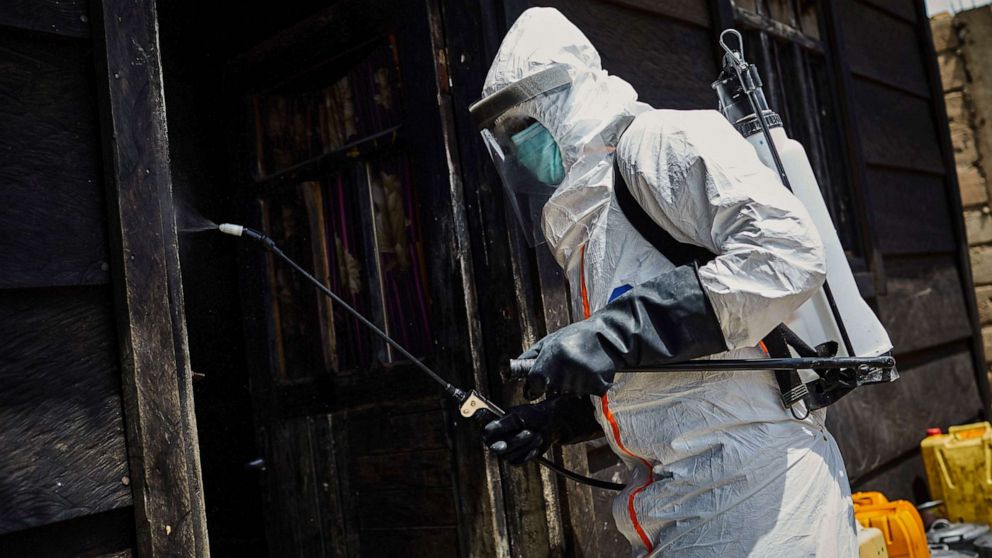World's 2nd-largest Ebola outbreak surpasses 3,000 cases - ABC News

The second-largest, second-deadliest Ebola outbreak in history has exceeded 3,000 cases, as the yearlong epidemic continues to grow despite access to an experimental vaccine and developmental treatments.
A total of 3,004 people have reported symptoms of hemorrhagic fever in the eastern Democratic Republic of the Congo since Aug. 1 of last year, according to the U.S. Department of Health and Human Service. More than 2,000 of those individuals have died from the disease, which is transmitted through contact with blood or secretions from an infected person and causes an often-fatal type of hemorrhagic fever.
The grim milestone comes a month after the WHO declared the outbreak an international emergency.
"Security issues in the affected areas make this the most challenging Ebola outbreak in history, but the U.S. government and our local and international partners remain undeterred and will not rest until the outbreak is ended," HHS Secretary Alex Azar said in a statement Thursday.
This is the 10th Ebola outbreak in the Democratic Republic of the Congo and the most severe there since 1976, when scientists first identified the virus near the eponymous Ebola River. It's also one of the worst Ebola outbreaks on record anywhere, second only to the 2014-2016 epidemic in multiple West African nations that infected 28,652 people and killed 11,325, according to data from the U.S. Centers for Disease Control and Prevention.
The ongoing outbreak is now spread across three eastern Congolese provinces that share international borders with South Sudan, Uganda, Rwanda and Burundi.
On Thursday, Uganda’s Ministry of Health said that a 9-year-old Congolese girl with Ebola had traveled across the border to Uganda from the Democratic Republic of the Congo with her mother to seek medical care. The child has been placed in isolation at an Ebola treatment center that was set up in a nearby Ugandan town in preparation for cross-border cases, according to the health ministry.
The WHO's director-general has described the current outbreak as more complex than the deadlier 2014-2016 outbreak in West Africa due to the region's political and security instability, attacks on health workers, a highly mobile population and community mistrust and misinformation.
Bob Kitchen, vice president for emergencies at the International Rescue Committee (IRC) -- one of the aid groups on the ground assisting Congolese health officials -- said in a statement that many people in the affected areas are "afraid to seek treatment for illnesses, worried they will be sent to an Ebola treatment center where they fear they could contract the disease."
The "lack of community acceptance" remains the greatest obstacle to containing the outbreak, Kitchen said, according to a statement.
"Building trust with the community doesn’t just mean dialogue with the affected population," he added. "It means working with the community to adapt the response and address the overall needs they are facing inside and outside of the Ebola outbreak."
Although the average number of new cases reported per week has dipped slightly during the last few weeks, the number of affected areas has increased.
Cases have been identified in new geographical areas in recent weeks, though the epidemic's epicenter is North Kivu province, where conflict and limited infrastructure has hampered the response.
There have been 1,998 deaths so far, including 1,893 people who died from confirmed cases of Ebola. The other deaths are considered probable cases. Fewer than 900 people sickened with the virus have recovered so far, according to the latest data from Congolese officials and the WHO.
An experimental Ebola vaccine developed by American pharmaceutical company Merck that was tested in the West Africa epidemic was approved for use in the Democratic Republic of the Congo a week after the outbreak was declared last year. More than 206,000 people in the current outbreak zone have received the experimental vaccine since Aug. 8, 2018.
Meanwhile, two of four experimental treatments being tested in the outbreak are now being offered to all patients after showing promise in saving lives. Preliminary findings from a randomized controlled trial that began last November in four Ebola treatment centers in North Kivu indicated that patients receiving either of two antibody-based therapies, known as REGN-EB3 and mAb114, had a greater chance of survival compared to those receiving two other experiential drugs, known as ZMapp and remdesivir.
After a meeting to review the initial results, an independent monitoring board recommended all future patients be offered either REGN-EB3 or mAb114, while the other two treatments be stopped.
"From now on, we will no longer say that Ebola is incurable," Dr. Jean-Jacques Muyembe, director general of the Democratic Republic of the Congo's National Institute for Biomedical Research, which is co-sponsoring the clinical study, told reporters during a telephone briefing earlier this month.
But the epidemic is still not under control. Doctors Without Borders/Medecins Sans Frontieres (MSF), a medical charity which is providing care for Ebola patients in collaboration with Congolese authorities, said it is "extremely concerned about the lack of visibility on the actual epidemiological situation," since a high number of Ebola deaths are being reported from where people live, rather than from treatment centers, in recent weeks.
"Many people have died of Ebola in their communities before they could be identified, diagnosed, and admitted for treatment of the disease," MSF said in a statement Thursday. "Roughly a third of Ebola-related deaths have been diagnosed only post-mortem, which is a clear indication the response to the epidemic is failing in identifying and tracing people who’ve potentially contracted Ebola."
https://ift.tt/2MHx7tr


Comments
Post a Comment